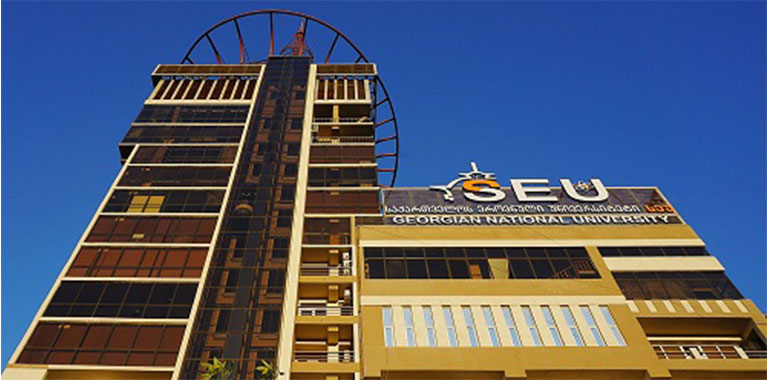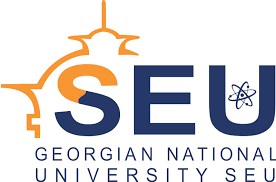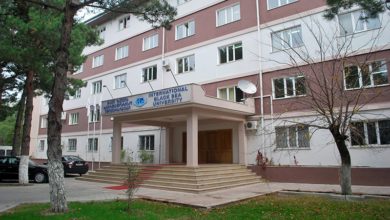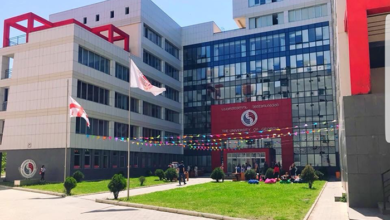Study Medicine at Georgian National University

University logo:

- Program name: MEDICINE
- University name: Georgian National University
- Faculty: Medicine
- Program supervisor: George Gurgenidze – MD, PhD, Associate Professor
- Web-page: https://www.seu.edu.ge
- University address: 9 Tsinandali Str. Tbilisi, Georgia
- Representative email: enroll@orientcities.com
Medicine Program Overview
AIM OF THE PROGRAM
The Medicine Program aims at providing the graduates with necessary knowledge and competencies relevant to the national and international standards of the field that will ensure their further study in professional direction; ensure with the modern, deep, systemic, and integrated knowledge of biomedical, preclinical, clinical sciences and its application into practice, facilitate their motivation for continuous improvement of their knowledge and life-long learning, develop interpersonal, clinical skills, decision making based on the evidence-based data, understanding clinical cases in broad social, cultural contexts to promote health, well being and prevent diseases, understanding of a physician’s professional, ethical and legal responsibilities and contribute to the field development in the constantly changing environment.
Therefore, the goals of the program are to provide the graduates with the:
• Knowledge of biomedical and clinical sciences, its scientific methods and principles, and the necessity for Life Long Learning (LLL).
• Clinical, interpersonal, and practical skills.
• Case-based clinical reasoning and taking decisions.
• Understanding clinical cases in a social, cultural context.
• Understanding of a physician’s professional, ethical, and legal responsibilities.
LEARNING OUTCOMES
Field-Specific Knowledge
Knowledge and Understanding
The graduate is able to:
• Determine the normal structure of the human body from cell level to organ systems, functioning of the body, molecular biology and embryonic development of a human body, metabolism and hormone functions, function of the immune system.
• Determine the fundamental principles of behavioral and social sciences – Human development (child, adolescence, adult), human psychology, sociology;
• Identify the basic principles of clinical sciences, clinical sciences of different specialties and subspecialties of medicine – pathological structure and mechanism of the disease, infection, and mechanisms of its development, immunity;
• Determine the use of antibiotics and resistance to antibiotics; the principles of prescribing the medicines; the side effects of medicines; interaction of medicines; blood and blood transfusion; drug action and pharmacokinetics; segregated drugs;
• Determine the prevention of diseases; lifestyle, diet, and eating; health support; screening and supervision of diseases; disability; gender issues in health care; epidemiology; the cultural and ethics influence on health care; resource distributing and health care economy; global health and inequality;
• Determine ethical and legal principles in medical practice – the rights of patients; the rights of people with disabilities; the principles of relations with colleagues.
• Determine the role of doctors in the health care system – legislation regarding medicine; the systems of professional regulations; the principles of clinical audit; the ways of health care access.
1. Carry out a consultation with a patient
take a case history, carry out a physical examination, make clinical judgments and decisions, provide explanation and advice, reassurance, and support, assess the patient’s mental state
2. Assess clinical presentations, order investigations, make differential diagnoses, and negotiate a management plan
recognize and assess the severity of clinical presentations, order appropriate investigations and interpret the results, make differential diagnoses, negotiate an appropriate management plan with patients and carers, take care of a terminal patient and his family members, manage the chronic disease.
3. Providing first aid in emergency medical situations (First aid and resuscitation measures)
Identify and assess the emergency medical conditions, treat emergency medical conditions, provide with first aid; age peculiarities in newborns and children; conduct the basic life maintaining and cardiopulmonary resuscitation activities in compliance with the guidelines; conduct the activities for enhancing lifetime maintenance in accordance with the guidelines; treat of traumas according to the guidelines.
4. Drug prescription
Prescribe drugs clearly and properly with consideration of patient’s age, match appropriate drugs with clinical context; review the appropriateness of drugs and other therapies and evaluate potential benefits and risks for the patient; treat pain and distress; consider the compatibility of drugs before initiation of treatment.
5. Conducting Practical Procedures – vital signs: pulse, respiration, temperature, measure blood pressure, oxygen delivery, patient transportation and treatment, urinalysis, electrocardiography, electrocardiography interpretation, performing respiratory function test; manipulators and manikins – bronchoscopy, venipuncture, venous catheterization, drug injection into the vein and infusion device, subcutaneous and intramuscular injection, urinary catheterization, lumbar puncture, spinal anesthesia, paracentesis, gastric lavage, gastrostomy tube care, putting and removing stitches, wound treatment, suturing, etc.
6. Communicate effectively in a medical context
Communicate with patient, colleagues, breaking bad news, patient’s relatives, disabled peoples, in seeking informed consent, provide with the written communication (including the medical records), in dealing with aggression, with those who require an interpreter, with law enforcement agencies and mass media, with any person regardless of his/her social, cultural, religious and ethnic background.
7. The use of Ethics and Legal Principles in Medical Practice
Use ethical principles and analytical skills in the treatment process, keep confidentiality, get informed consent and make an appropriate record, issue death certificate, require an autopsy, apply Georgian and international legislation during treatment, conduct medical practice in a multi-cultural environment.
8. Evaluation of psychological and social aspects regarding patients’ disease.
Evaluate the psychological factors of disease detection and impacts on the patients, the social factors of disease detection and impacts on the patients, recognize the stress related to disease, recognize the drug and alcohol abuse.
9. The use of knowledge, skills, and principles based on evidence
Use evidence in practice, determine and conduct the relevant literature research, critically analyze the published literature, make conclusions and use them in practice.
10. Use information and information technology effectively in a medical context
Keep accurate and complete clinical records, use IT in medical practice, access specific information sources, store and retrieve information, keep personal records.
11. Ability to apply scientific principles, methods, and knowledge to medical practice and research
Identify the research conducting methodology; Determine the research designing, planning, result processing, and conclusion-making skills; use the achievements of biomedicine in practice; report/review writing skills based on critical; provide with the analysis of the research literature in biomedicine; determine the ethics of conducting scientific research.
12. Implementation of health-promoting events, engage with public health care issues, efficient performance within the health care system
Conduct the treatment that minimizes the risk of damage to the patient; implement measures for the prevention of infection spread; understand ones’ own health problems and evaluating ones’ own health with regard to professional responsibilities; participate in health promotion events both on individual and population-wide level; demonstrate the leadership skills for the improvement of the healthcare system; facilitate the changes in the healthcare system for strengthening the services and improving the results; work with patients and their families for enhancing the healthy behaviors; contribute to the improvement of community and population health.
13. Professionalism
Professional attributes
• Show probity, honesty, ethical commitment; commitment to maintaining a good practice, concern for quality; critical and self-critical abilities, reflective practice; empathy; creativity, initiative, interpersonal skills, leadership skills
Professional working
• Show the ability to recognize limits and ask for help, work autonomously when necessary, solve problems, make decisions, work in a multidisciplinary team, communicate with experts in other disciplines, lead others, adapt to new situations, capacity for organization, and planning.
The doctor as an expert
• Show capacity for analysis and synthesis, applying knowledge in practice, research skills, to learn (including lifelong self-directed learning), teach others
The global doctor
Appreciate diversity and multiculturality, understand cultures and customs of other countries, work in an international context, show knowledge of a second language, general knowledge outside medicine.
| AVAILABLE SPECIALIZATION | THE DEGREE AWARDED | AMOUNT OF ALLOCATED ECTS | DURATION OF STUDY | THE LANGUAGE OF STUDY | ANNUAL INSTALLMENT |
|---|---|---|---|---|---|
| Medicine | Medical Doctor (MD) | 360 ECTS | 6 years, 12 semesters | English | $5 500 USD |
Register Now!!! and Begin Your Journey Towards Becoming a Certified Medical Doctor!
Representative email: enroll@orientcities.com
The documents required to obtain admission:
- Copy of the passport;
- School certificate (Equivalent to A level for Undergraduate Applicants / BA degree Diploma (for MA degree applicants) along with transcript;
- Application fee payment receipt.
- Video Interview (Ask us for details of this interview)
- The student’s E-mail address and contact details



